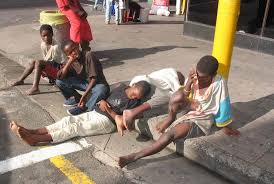Patricia Mashiri and Joyce Mukucha
Cases of children who are surviving on the streets of Harare are notably increasing on a daily basis and the estimated statistics is around 4 701.
What is raising eyebrows of the majority is that some of these children come to solicit on the streets during the day go back home at night, meaning they stay with families.
Some of these street kids are being abused by parents and close relatives they stay with in the communities which then leads them to go on the streets.
According to a survey done by Spiked Online Media, a number of these children confessed that they stay with their parents and guardians who command them to go and beg on the streets for the survival of the whole family.
Marble Matare (not her real name) said her mother used to instruct her to go out onto the streets and do whatever that she could to get money home. Failure to do that could land her in trouble.
“My heart was broken when my mother forced me into such a disgusting life. When I turned 18, I ran away from home and lived on the streets with Tobias my boyfriend. We started living husband and wife. We didn’t use protection when having sex so I fell pregnant,” she said.
When her boyfriend noticed that she was pregnant, he abandoned her. She took vare of the baby alone on the streets.
There are tales of street kids who have nowhere to go. Their parents or guradians may have succumbed to HIV/AIDS.
Deaths on the streets are increasing and depressing stories are heard each and every day. Investigations by Spiked Online Media showed that many street kids are killed or abused by businessmen for ritual purposes. The businessmen believe that if one kills young innocent children, their commercial entities will thrive. Superstion has it that raping of virgin girls is associated with cleansing the HIV virus.
Sithembile Mutasa, 16 (not her real name) said she started living on the streets when she was 11 after her mother died and her father ran away from home and left her alone.
“I was only 11 when I began to stay on the streets because I had no option when life became tough for me. When my mother died, our father just left home and didn’t come back. It bacame my responsibility to look for food so that I could survive.
“It was difficult for me to find money whilst at home so I realised that I could earn a living from the streets. Sometimes I look for older men to have sex with. In exchange, they give me money but I’m afraid of contracting HIV/AIDS because some men don’t want to use protection. I live in fear but I have no option.”
Courage Makasi started living on the streets of Harare when his grandmother died. He does not know his parents because her mother remarried when he was only two and never came back when his grandmother passed away.
“I don’t know my mother and I’m not sure whether she is still alive or not. Before my grandmother passed away she told me that my mother remarried when I was two years old and went away with the new husband.
“Grandmother had no idea of where she went to live with the man she is married to. I’m looking for her but I don’t remember her face and I’m sure she does not recognise my face. Life on the streets is not pleasing at all because we have to hunt for food daily and sometimes we quarrel over the safe spots to sleep,” Makasi said.
The future of these children is bleak. It is regrettable that these children are engaging into drug abuse, robbery and bullying among other vices.
The United Nations Convention on the Rights of the Children states that children have the right to education, food, heal th and a safe environment.
The 2014 UN committee on the Rights of children said there was need to increase awareness and knowledge among policy makers of the specific challenges street children face.






